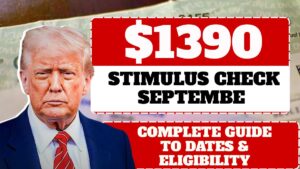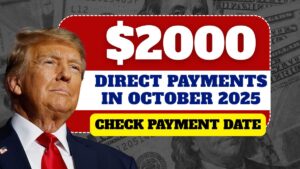In 2025, the buzz around $5,500 stimulus checks has taken social media by storm. Millions of Americans, still grappling with inflation and high living costs, are wondering if the government will distribute a massive payout to “everyone.” But what’s the reality behind these claims? This article breaks it all down—rumors, facts, and who may actually benefit.
The Origin of the $5,500 Stimulus Rumor
The $5,500 figure has circulated widely online, but it is not part of any official IRS or Social Security announcement. Its origin can be traced to:
- Online discussions blending tax refund averages.
- State rebate programs.
- Past pandemic-era stimulus checks.
While the number looks impressive, no federal law or official announcement confirms a universal $5,500 stimulus check in 2025.
Federal Position on Stimulus in 2025
As of September 2025:
- Neither the IRS nor the U.S. Treasury has authorized a new nationwide stimulus check.
- Current federal payments are limited to:
- Social Security (SS, SSI, SSDI)
- Tax credits like the Child Tax Credit and Earned Income Tax Credit.
While Congress could introduce future relief programs, no bill offering $5,500 stimulus checks has been passed.
State-Level Relief Programs
The $5,500 rumor is often linked to state rebate programs, where some states have issued one-time payments ranging from a few hundred dollars to over $1,000. Examples include:
- Alaska’s Permanent Fund Dividend (PFD): Pays residents substantial annual amounts, sometimes exceeding $3,000.
- State tax refunds or budget surplus payments: These can bring totals closer to $5,500 for certain residents.
Important: These payments do not apply nationwide, only to residents of specific states.
Who Might Actually See Extra Payments?
Certain groups may see additional support in 2025, but this is not a universal stimulus check:
- Social Security beneficiaries
- Low-income families
- Residents of states with budget surpluses
Any payout as high as $5,500 would require new federal legislation, which has not yet been introduced.
Key Takeaways for Americans in 2025
- The $5,500 stimulus check for everyone is a viral rumor without official backing.
- Some states may issue relief or rebate payments, but amounts vary.
- Social Security and other existing federal benefits continue as scheduled.
- Always rely on official sources like IRS.gov or SSA.gov for accurate updates.
Why the Rumor Spreads So Fast
Social media and online content can exaggerate numbers for clicks and shares. Merging state-specific rebates, tax refunds, and pandemic-era payments creates a figure that looks plausible but does not reflect federal policy.
- Eye-catching headlines = viral content
- Misinterpretation of state programs = confusion
- Desire for financial relief = rapid spread
Practical Advice for 2025
If you’re hoping for extra cash, here’s what you should do:
- Check official channels: Only trust announcements from the IRS or Social Security Administration.
- Monitor state-specific programs: Your state may have its own rebate or bonus programs.
- File taxes on time: Some rebates require 2024 tax return filings.
- Plan your finances realistically: Don’t count on viral rumors for your budgeting.
Conclusion
The 2025 $5,500 stimulus check is not a reality for all Americans. While certain groups may receive state-level relief or ongoing federal benefits, there is no nationwide payout of $5,500. Americans should focus on verified information and continue using federal programs like Social Security, Child Tax Credits, and Earned Income Tax Credits for financial support.
Bottom line: The viral $5,500 claim is a rumor. Rely on official sources for accurate updates, and stay informed about state and federal relief programs.
FAQs
Is the $5,500 stimulus check real for all Americans?
No. The $5,500 figure is a viral rumor. No federal program is distributing this amount nationwide in 2025.
Who might receive extra payments in 2025?
Specific groups like Social Security beneficiaries, low-income families, and residents of states with surplus funds may see additional support.








